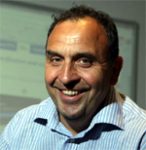Our Executive Team
Dr Mike Bartley has over 30 years of experience in software testing and hardware verification. He has built and managed state-of-the-art test and verification teams inside several companies (including STMicroelectronics, Infineon, Panasonic, and the start-up ClearSpeed) and also advised several companies on organisational verification strategies (ARM, NXP, and multiple start-ups). He has been working on the application of artificial intelligence (AI) since using genetic algorithms in 1998 and now helps companies to adopt best practice AI to improve everyday efficiency and customer experience and engagements.
Mike successfully founded and grew a software test and hardware verification services company to 450+ engineers globally, delivering services and solutions to over 50+ clients in various technologies and industries. The company was acquired by Tessolve Semiconductors, a global company with 3000+ employees supporting clients in VLSI, silicon test and qualification, PCB, and embedded product development in multiple vertical industries.
Mike is currently a Senior VP at Tessolve supporting VLSI globally, focusing on helping companies incorporate the latest verification and AI techniques and strategies into their verification flows and building verification teams to support these companies in implementing them on IP and SoC projects. He is also responsible for the Tessolve Centres of Excellence running all R&D projects with Tessolve, including building a new AI capability across all Tessolve products and services.
Mike has a PhD in Mathematics (Bristol University) and nine MScs in various subjects, including management (MBA), software engineering, computer security robotics and AI, corporate finance, and blockchain and digital currency. He is studying part-time for an MSc in quantum computing at the University of Sussex and the use of technology in healthcare at the University of Glasgow, as well as a Stanford Professional Certificate in Artificial Intelligence.
Finally, Mike is an active angel investor and board/strategic advisor, having obtained a Financial Times Non-Executive Director Diploma. He has invested in 25+ tech start-ups since 2017 and advises many of them on both growth and investment strategy, as well as providing board level strategic advice to other companies. He has also studied with the Barcelona Ventures Silicon Valley Investor training.
Dr Michael George Bartley
![]()
|
|
|
|
|
|
|
![]()
|
|
![]()
|
Feb 20 – |
Senior Vice President,Tessolve |
Responsible for European P&L. global VLSI sales support, R&D & AI strategy |
|
May 08 – Feb 20 |
Founder and CEO, Test and Verification Solutions Limited |
Developing UK-based self-funded company delivering services in software testing and hardware verification, acquired by Tessolve |
|
June 06 – May 08 |
Software Test and Hardware Verification Manager, ClearSpeed Technology Plc |
Responsible for the test and verification of all ClearSpeed SW & HW products, and the outsourcing of appropriate efforts to achieve that
|
|
02 – 06 |
Software Test and Hardware Verification Manager, Elixent (now Panasonic) |
Responsible for the test and verification of all Elixent SW & HW products
|
|
`99 – 02 |
Hardware Verification Manager, |
Responsible for creating a new HW verification team and processes, and for spreading excellent QA practises across Infineon
|
|
`94 – `99 |
Verification Engineer, STMicroelectronics |
|
|
`93 – `94 |
Lecturer, Bath College |
|
|
`90 – `93 |
Software Engineer, Praxis |
|
|
`88 – `90 |
Programmer, IPL |
|
|
`90 – `99 |
Lecturer (part-time), Open Uni |
|
| 2024 | M.Sc. Blockchain and Digital Currency (University of Nicosia) | DoB | 29/7/62 |
| 2022 | M.Sc. (with Merit) in Data Science, Technology & Innovation (Uni of Edinburgh) | Address | 23 Consort House |
| 2022 | M.Sc. (with Merit) in International Corporate Finance (Uni of Salford) | 26 Queensway, | |
| 2021 | M.Sc. (with Merit) in Intelligent Systems & Robotics (De Montfort Uni) | London W2 3RX | |
| 2019 | M.Sc. (with Merit) in Information Security (Uni of London) | Mobile |
+44 7796 307958 |
| 2008 | ISEB Practitioner Certificates in SW Test Mgt & Analysis |
|
|
| 2001 | MBA (Open Uni) | Chairman of the British Computer, | |
| 1999 | MBA in Technology Management (Open Uni) | Society, Bristol (‘91–‘01, ‘10 – ‘15) | |
| 1997 | M.Sc. in Software Engineering (Open Uni) | DVClub, Europe organiser (2008 – ) | |
| 1988 |
Ph.D. (thesis on Category Theory) (Bristol Uni) |
High-Tech Sector Chair, WoE LEP | |
| 1986 | M.Sc. (with distinction) in Logic (Bristol Uni) | Chair of External Advisory Board for | |
| 1984 | Postgraduate Certificate in Education (Bristol Uni) | Computer Science, Uniof Bristol | |
| 1983 | 1st Class Hons. Degree in Mathematics (Bristol Uni) |
|
|
| 1980 | A-levels: Maths (A); Further Maths (A); Physics (A) |
|
|
![]()
| Work Based | Agile Development; C; SQL; Report Writing; Technical, Quality and Resource Planning; Presentation Skills; Principles of Management; C++; Java; VHDL; Model Based Test Generation; Verilog; Synthesis; Specman; SystemC, System Verilog; OVM; |
| Open Uni | SW Engineering; Computer HW and Operating Systems; Project Management; Switching for Digital Telecommunications; Object-Oriented Software Technology; The Competent Manager; Technology Management; Knowledge Management; Strategic Management; Financial Management |
![]()
|
|
|
|
|
|
|
|
|
|
|
|
|
|
|
|
|
|
|
|
|
|
|
|
|
|
|
|
|
|
Further details
Technology growth experience
I successfully started a self-funded, UK tech services company Test and Verification Solutions (T&VS) in 2008 and grew it to a global $8M+ revenue, $1M+ profit company that was acquired in 2020. As CEO, I put together a strong senior management team along with external advisors and developed an international strategy that enabled the executive to deliver against well-defined targets across the organisation.
T&VS developed a strong consultancy business (in hardware design verification) with 400+ engineers worldwide. T&VS demonstrated “thought leadership” in our chosen niche and this created a very strong brand that helped to attract large, multi-nationals to engage us on large consultancy opportunities with long, follow-on contacts. This involved a number of strategies, including speaking at conferences as well establishing our own well-attended conferences; generating white papers; strong social media presence; being present and often leading on industry bodies; a strong network of partners and suppliers; staying at the leading edge of developments in industry development. We also tried to develop a similar consultancy business on software testing but we were not as successful and faced multiple challenges. My analysis suggests this was due to not being able to create a strong brand against incumbents in a more mature industry (the hardware verification sector was in a growth phase based on increasing device complexity and continuous innovation).
I faced a number of challenges boot-strapping T&VS from 1 person in the UK to 400+ globally. Firstly, I ensured that we always had strong cash flow able to withstand temporary periods of loss as we entered new territories. I also established a strong operational support early on to give me the time to focus on growth through strong global marketing. When entering major new territories, I ensured a strong local management team with an eye on minimising overheads. I also ensured we had a low-cost exit strategy in case the territory did not prove successful. As we grew, I put in place a share option scheme which helped to ensure the senior management team stayed in place through the journey to acquisition (and beyond).
I am now SVP at Tessolve supporting an aggressive growth plan to enable an IPO. Tessolve helps customers to develop and test silicon chips, and then into embedded products. My main roles involve growing sales and delivery capability in Europe, global technical sales supporting, and developing capability in emerging technologies.
Angel Investment Experience
I have been investing in tech start-ups for more than 3 years. My main criteria for investment selection are: the strength of the management team and their prior experience in start-ups and the target sector; analysing the technology and the potential to disrupt the existing target market; the realistic addressable market; the investment documents; and finally the exit plan. My decision is then based on their presentations, investment documents, my analysis of their technology and the target market and, most importantly, discussions with the founder(s) and any existing investors or advisors.
Having invested I stay in regular contact with the team, giving strategic and technology advice as requested. I find it useful to identify and track key metrics against forecast. This includes basic gross revenue; profit/loss; sales; customer acquisition costs and retention; revenue concentration; operational efficiency. A major metric is runway and plans for raising future finance: purpose; size of investment and where they will take the company; valuation and potential dilution. Finally, it is important to see a clear path to possible exits with their expected timescales.
Board Advisory Experience
I have been advising the founders of a technical training company for the past 2 years on a strategy bringing in a new executive team to grow the company and bring investment whilst the founders divest their interests. We have now established a more formal board structure and I am moving forwards as a board advisor.
In 2019, I was appointed Chair of the External Industrial Advisory Board for the Computer Science Department at the University of Bristol. The key role is to ensure that the Board members can make a positive contribution to the strategy and advise on operational issues. I work closely with the Head of Department to present the key strategic aims to the board, explain the objectives for the board members, and set the agenda for each meeting. A large amount of the work needs to be performed in subcommittees and these are established with clear objectives, membership, chair, timescales and reporting frameworks. The Head of Department is appointed for a limited time and so I help to ensure continuity of the boards work
I have served on a number of public committees to provide independent oversight including Chair of the High-Tech Sector Group accountable to the West of England Local Enterprise Partnership. As a team, we were tasked with reviewing strategies to grow high-tech employment in the region and working with local public bodies to deliver on them. I developed appropriate committee meeting behaviours such as objective analysis, openness, full contributions and non-critical challenge. As a Director of the High-Tech Bristol and Bath CIC, I contributed to the development of strategies that are successfully engaging young people and children with computing. We have pivoted this to a charity DigiLocal where I am trustee, providing independent assurance on the appropriate running of the charity. More recently, I am Chair of the External Advisory Board for the Department of Computer Science at the University of Bristol), reviewing and providing advice on a range of subjects including student welfare, academic quality and expansion.

